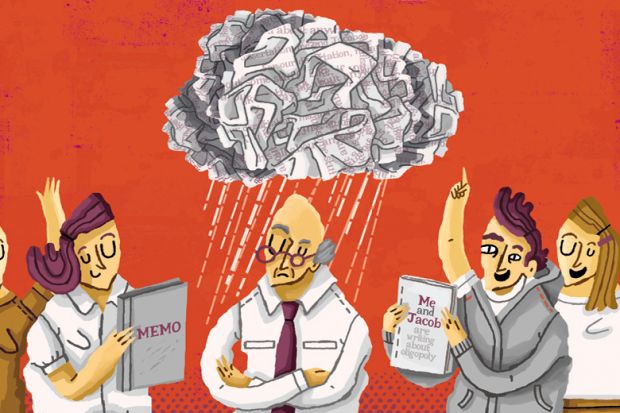You may be aware of a common condition afflicting men of a certain age called Irritable Male Syndrome. Some medical experts attribute it to declining levels of testosterone production. That is controversial, but, when it comes to professors, one deficit is beyond dispute: that of time.
So whenever the academy obliges us to waste any of those precious days before we go “on leave” for ever, it can make us a wee bit cranky. Some years ago, a retiring colleague told me that in his final year of teaching, the mundane annoyances of academic life, cheerfully endured for almost four decades, began to feel unbearable. With two years to go, this is already happening to me.
I’m having more trouble with academic memos, for instance. I can no longer calmly read a sentence like: “The College’s five-year development plan affirms its commitment to excellence in education.” This is so obviously true that I don’t see any reason why I need to be forced to read it. I propose that any academic statement must meet the same standard of meaningfulness as scientific statements do: falsifiability. In other words, a memo can make a statement only if the memo could conceivably have stated its opposite. Will I ever read an announcement that “The College’s five-year development plan renounces any commitment to excellence in education”? No? Then I don’t need a statement affirming that commitment either.
For my sins, I serve on my institution’s Academic Honesty Subcommittee, which, as you know, deals with the exact opposite of academic honesty. It is the college’s rule that when an instructor encounters suspicious activity – which could be an uncited source, two uncannily similar homework papers or even a mobile phone on someone’s lap during a final exam – investigation is the sole responsibility of the subcommittee (the professor is no longer involved).
So I regularly serve as a kind of judge. The investigations require hearings with the students, meetings to decide outcomes and drafts of “findings” emailed back and forth. It takes time and energy to conclude that, as it were, plagiarism was committed by Colonel Mustard in the drawing room with the lead pipe. It all puts me in a very bad frame of mind.
Whether or not there has been any dishonesty – students are regularly acquitted – someone is guilty of the very serious crime of adding to my workload at a busy time of year. Left to my own devices, I would adjudicate as if I were presiding over a 1930s Moscow show trial: everyone connected to the case in any way – and their families – would get 10 years’ hard labour in the Gulag Archipelago.
Then there are the words I just can’t bear to hear any more. In the middle of my senior seminar last semester, seized by an inexplicable impulse, I stood up and emptied my wallet. Eighty or so dollars lay on the walnut tabletop. “You can have all of that,” I told my dozen students. “Use it for a class snack fund. But” – and here I paused ominously – “for each student who says ‘like’ inappropriately, I will take one dollar back.”
The students looked at each other. They clearly understood what a challenge I was posing. In negotiation, we agreed that I wouldn’t charge a dollar for each utterance of “like” – in which case none of them would ever taste a single potato chip or cookie. Instead, I would fine the fund on a daily, one‑student/one-like basis. By the end of the first day’s session, I had recovered three dollars. I can’t remember the total for the semester, but it wasn’t far short of eighty dollars.
I also find that, in my professorial dotage, words that ought to remain in my head somehow end up coming out of my mouth. I have begun actively rebuking people, especially students. Last semester a young man came up to me after class and said: “Me and Jacob would like to do our case study on oligopoly.”
“Who would?” I answered.
“Me and Jacob.”
I frowned deeply and gripped his arm. “Who would?”
Alarm spread across his face, “Me and –” I squeezed. He stared for a second, then smiled sheepishly and said, “Jacob and I.” I released his arm and patted it gently.
Yes, you’re right, that isn’t mere crankiness: it’s borderline assault. And I’m pretty sure I never physically harassed students in my first 30 years of teaching. (Heavy sigh.)
You could argue that all this grumpiness is just nature’s way of telling me it’s time to move on. I feel like someone at the end of a long and pleasant day at the beach, who senses that the warm sea breeze has turned chilly, the lounger is starting to chafe and the last sandwich tastes gritty with sand. It has been such a wonderful visit, but the tide is coming in and perhaps I need to pack up and go.
But another school of thought is that there is good reason to be grumpy. Perhaps some of these sins against the good use of time, vocabulary and grammar should bother all of us enough to protest against them out loud. Perhaps those younger than I am should not wait until their testosterone drops away before casting propriety aside and making a stand against the decline of civilisation.
Mark Montgomery is Donald L. Wilson professor of enterprise and leadership at Grinnell College, Iowa.
POSTSCRIPT:
Print headline: Tenure’s end, tether’s end
Register to continue
Why register?
- Registration is free and only takes a moment
- Once registered, you can read 3 articles a month
- Sign up for our newsletter
Subscribe
Or subscribe for unlimited access to:
- Unlimited access to news, views, insights & reviews
- Digital editions
- Digital access to THE’s university and college rankings analysis
Already registered or a current subscriber? Login




